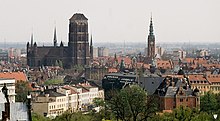| Revision as of 15:16, 26 August 2005 editKresspahl (talk | contribs)Extended confirmed users4,863 editsmNo edit summary← Previous edit | Revision as of 12:53, 2 November 2005 edit undoHalibutt (talk | contribs)Autopatrolled, Extended confirmed users, Pending changes reviewers34,067 editsm St. Mary's Church, Gdańsk moved to Kościół Mariacki, GdańskNext edit → |
| (No difference) | |
Revision as of 12:53, 2 November 2005
St. Mary's Church (Polish: Bazylika Mariacka, German: Marienkirche) or, properly, Basilica of the Assumption of the Blessed Virgin Mary in Gdańsk is the largest brick church in the world, and one of the largest Brick Gothic buildings in Europe. It is 105.5 m long, and the nave is 66 m wide. Inside the church is room for 25,000 people. It is an aisled hall church with a transept.
History
Initially the site of the church was occupied by a six-span basilica with a low turret, erected between 1343 and 1360. Parts of the pillars and lower levels of the turret are preserved from this building.
In 1379 a masonry master Henryk Ungeradin with his team started construction work on the present church. By 1447 the eastern part of the temple was finished, and the tower was raised by two floors in the years 1452-1466.
Since 1485 the works were carried over by Hans Brandt, who supervised the erection of the main nave core. The works were finally finished after 1496 under Heinrich Haetzl, who supervised the construction of the vaulting.

Until 20th century both the church interior and exterior were well preserved. The church was severely damaged in World War II, during the storming of the city by the Red Army in March 1945. The wooden roof burned completely and most of the ceiling fell in. 14 of the large vaults collapsed. The windows were utterly destroyed. In places the heat was so intense that some of the bricks simply melted, especially in the upper parts of the tower which acted as a giant chimney. The floor of the church containing priceless gravestone slabs was torn apart, allegedly by Soviet soldiers attempting to loot the corpses buried underneath.
Fortunately, most of the artworks from the interior survived, as they were evacuated for safekeeping to the villages surrounding the city. Many of these have returned to the church, but some are displayed in various museums around Poland. Efforts are underway to secure their return.
The reconstruction started shortly after the war in 1946. The roof was rebuilt in August, 1947. After the basic reconstruction was finished, the church was reconsecrated on 17 November, 1955. The reconstruction and renovation of the interior is an ongoing effort and continues to this day.
Architecture
St. Mary's Church is a triple-aisled basilica with a triple-aisled transept. Both the transept and the main nave are of similar width and height, which is a good example of late gothical style. Certain irregularities in the form of the northern arm of the transept are remnants of the previous church situated on the very same spot.
The vaulting is a true piece of art, and was completely restored after the war. Main aisle, transept and presbytery are covered by net vaults, while the side aisles are covered by crystal vaults.
The exterior is dominated by plain brick plains and high and narrow gothical arch windows. Such construction was possible due to placing corbels and buttresses inside of the church and erecting chapels right in between them. Upper parts of the elevation are covered by a set of brick pinnacles. All corners are crowned with metal headpieces (reconstructed after 1970).
Interior
The church is decorated within with several masterpieces of Gothic, Renaissance and Baroque painting.
The most notable, The Last Judgement by Flemish painter Hans Memling, is currently preserved in the National Museum of Gdańsk. Other works of art were transferred to the National Museum in Warsaw in 1945. It wasn't until 1990s when several of them were returned to the church. The most notable parts of internal decoration are:

- Jerusalem Altar, 1495-1500 (currently in the National Museum in Warsaw)
- Main Altar, 1511-1517, Michael of Augsburg
- Ten Commandments, approx. 1485
- Gravestone of Simon and Judith Bahr, 1614-1620, Abraham van den Blocke
- Pietà, approx. 1420
- Holy Mother of God sculpture, approx. 1420
- astronomical clock, 1464-1470, Hans Düringer of Toruń, reconstructed after 1945.
- organ set, partially transferred from the St. Johns church in 1985.
See also:
External links:
- Brief history of the church
- Organ set of the St. Mary's church (Polish and German)
- History of pipe organs at St. Mary's Church from past till present (in English, Polish and German)